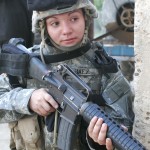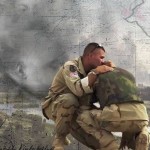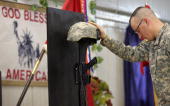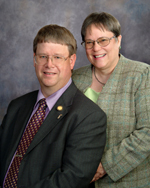Feb
26
Transitioning from combat to college
Filed Under Civilian life | Comments Off on Transitioning from combat to college
Returning combat vets who enter college can find the transition from combat to college to be difficult. Wenatchee Valley College in Washington offers an innovative way to allow veterans to gradually ease in to civilian life. Veterans have their own study house/lounge and are members of a group called STAVE (Student Transitional Assistance for Veterans’ Education.) STAVE was started by local veterans to help bring understanding about veteran students to faculty and other students. In addition to fundraising efforts to help needy families, the group arranges for counseling, financial assistance and tutoring for vets trying to get through school.
You can read the original story here.
Feb
23
PTSD: Community and Family Scars
Filed Under Treating PTSD | Comments Off on PTSD: Community and Family Scars
Last Thursday, Tony and I appeared on KGAB radio in Cheyenne, WY, followed by a book signing at a local book store. Our host, Dave Chaffin was a kind and thoughtful interviewer, much like Lorin and Dixie Ricker in Castle Rock. The broadcast was pretty typical for a book interview. That is, until listeners began calling into the station. We were talking about how a soldier’s neuro-network had been altered to react to combat threats and danger, and who when the individual returns home, his/her brain is still configured for combat and threat. For example, driving hazards are commonplace to everyday Americans. Road rage, stop & go traffic, debris alongside the roadway are all common occurrences. The combat veteran, however, can experience many of these things as a potential threat. A threat that can have a life and death consequence. An elderly lady phoned to tell of us of an experience she had while driving in downtown Cheyenne. She explained that while approaching a street light she had to stop quickly to avoid running the red light. The car behind her immediately whipped into the adjoining lane and the driver got out of his car, angrily walking toward her. She noticed he was wearing military fatigues. His face and demeanor were quite frightening to her, so she picked up her cell phone to call the police. Upon seeing this, the soldier turned and went back to his truck and left. The lady got his license plate and relayed the information to the police who contacted his commanders. What they discovered was this: The soldier had recently returned from Iraq and was having some severe adjustment problems. They asked the woman if she wanted to press charges, but she kindly declined. By no means does serving in combat excuse a person from inappropriate behavior, yet, it does show that combat PTSD can and will affect more than just the veteran and his/her family. It can impact the entire community in various ways, some that can be very negative. So the real message again is: “IF WE SEND THEM, THEN WE MUST MEND THEM”. For every one’s sake!
Another story: While at the book signing, we meet a young man in his early thirties. Initially, he wasn’t at all interested in purchasing our book, but he was intrigued by the title. When he sat down to chat, he began telling his story. He spoke of a stepfather who served in Vietnam and was incredibly cold, irritable, aggressive and cruel. Actually, he didn’t have a kind word to say. When we told him about the effects of combat and PTSD, he bought the book. His reason: Perhaps, he said, if he understood better what was going on with his step-dad, he might just be able to forgive him and lessen his own anger and hatred. The tragedy of this young man’s story is the fact it will be repeated over and over again unless, as a country, a community, and a family, we begin to build a greater awareness of how challenging trauma is to the well-being and health of everyone. PTSD is not a condition we can afford to disregard. The consequences will be too enormous and the costs, both economically and morally, too high!
Feb
20
PTSD and female soldiers
Filed Under Treating PTSD | Comments Off on PTSD and female soldiers

Psych Central has an article about the rising incidents of PTSD in female soldiers. Even though women are technically barred from combat, many are exposed to battle as they serve in support functions in combat areas.
Click here to read the article.
Feb
12
Link to Janet & Tony’s Radio Interview on Castle Rock Radio
Filed Under Events | Comments Off on Link to Janet & Tony’s Radio Interview on Castle Rock Radio
If you missed Janet and Tony’s interview today on Castle Rock Radio’s “Walking the Walk,” and “Getting Your Life Back,” click here to go to Castle Rock Radio’s website: http://castlerockradio.com/pages/page.asp?page_id=47571
Hosts: Lorin & Dixie Ricker
The download links are under the Media category on the left.
Feb
11
Castle Rock Radio “Walking A Walk”
Filed Under Events | Comments Off on Castle Rock Radio “Walking A Walk”
Thursday, February 12, 2009 @10:00 AM (MST)
“Walking A Walk”
Quote of the week: “We are now back on American soil, and again, we are reminded of how very much we love this country. Visiting Vietnam and Cambodia made it clear how very precious freedom is to a country, a people, and to us as individuals. To all those who have served America or are currently serving our great country abroad, thank you.” – Tony and Janet Seahorn, upon their return to the USA following their tour of SE Asia
This Week on “Walking A Walk” -This is it!… We’ve been letting you know about this special 2-hour edition of “Walking A Walk” for several weeks now, and it’s finally here! This week, our very special guests are Tony and Janet Seahorn, authors of the new book “Tears of a Warrior” (A Family’s Story of Combat and Living with PTSD). If you are a veteran who’s been struggling with PTSD or a TBI, or you know someone who is, please… tune in to this conversation with this remarkable couple! This is a cannot miss show!
Tony is a Vietnam vet (Dauntless Black Lions of the 1st Infantry Division) who has coped with his PTSD for more than three decades. Tony served in Nam from early 1968 until he was seriously wounded in December of that year. He was decorated for his service, earning two Bronze Stars, two Purple Hearts, an Air Medal for Valor in Flight, a Vietnamese Gallantry Cross, and a Presidential Unit Citation.
Janet is an educator, wife, mother and homemaker who has struggled for all those years beside Tony to try to help him cope with his PTSD. Indeed, in the early years, they didn’t even know what to call it… just that something was seriously wrong. Only in the past few years, a decade at most, has professional help and understanding of this disorder been forthcoming.
Their book is the chronicle of their path… “Our life’s journey for the past thirty-some years. We began writing our story several years back simply as a legacy for our two sons. But, with the Iraq war and soldiers returning from combat, we realized that there are many others who are now living our experience as well. Some certainly have more traumatic stories than ours. Combat PTSD is the silent bullet you never hear.”
In January, Tony and Janet took a significant and challenging tour of Southeast Asia, including a return to Vietnam – We’ll include their “trip report” in our conversation, and we’ll get their impressions and experiences in the land where Tony, along with so many brave American soldiers, friends and comrades, once fought a war.
This special broadcast just may hold some nuggets of hope for those vets and first responders who suffer from PTSD and TBI. Please, help us get the word out about this week’s show, and encourage anyone you know whom it might help to listen in – Your call-ins are welcome too!
Join us this Thursday at 10:00am MT, February 12th, with Janet and Tony on “Walking A Walk“! Please, invite your friends, family, combat vets and first responders to join us for this important conversation.
Brought to you by American Military Family, Inc. (http://AMF100.org), and funded in part by a generous grant from Intermountain Rural Electric Association (IREA). Castle Rock Radio, Community Programming with a World Wide Reach!
Feb
10
The Physcial Dangers of Fight/Flight/Freeze
Filed Under Treating PTSD | Comments Off on The Physcial Dangers of Fight/Flight/Freeze
 It has been a while since I last posted anything on our blog. Truthfully, after our trip to Southeast Asia I needed some down time and I’ve been busy getting my university classes up and running. During this time period, however, I continued to do more research and attended a conference on maintaining wellness. A growing number of studies regarding the physical impacts of severe trauma on an individual’s physical body keeps building. It is this information that continues to make it more essential that military personnel do all they can to implement immediate and effective interventions for troops returning from Iraq and Afghanistan with even mild cases of PTSD. What happens in the body when it has undergone frequent and extensive truama and it goes untreated is a multitude of physical problems. These are just some things to be aware of: high blood pressure, high heart rates, high cholesterol levels, insulin sensitivity, decreased immune system, problems with attention- ability to stay focused, and memory, digestive system out of whack, and a decrease in the levels of serotonin – a brain neurotransmitter that helps the body maintain a sense of calm. Pretty scary isn’t it? Left untreated the entire body – brain/mind and body – can make it incredibly difficult to live a long and healthy life. Never has it been more true than the motto in our book: “If we send them, then we must mend them.” As a nation we owe our combat vets at least that much for their service, their sacrifice, and their well-being.
It has been a while since I last posted anything on our blog. Truthfully, after our trip to Southeast Asia I needed some down time and I’ve been busy getting my university classes up and running. During this time period, however, I continued to do more research and attended a conference on maintaining wellness. A growing number of studies regarding the physical impacts of severe trauma on an individual’s physical body keeps building. It is this information that continues to make it more essential that military personnel do all they can to implement immediate and effective interventions for troops returning from Iraq and Afghanistan with even mild cases of PTSD. What happens in the body when it has undergone frequent and extensive truama and it goes untreated is a multitude of physical problems. These are just some things to be aware of: high blood pressure, high heart rates, high cholesterol levels, insulin sensitivity, decreased immune system, problems with attention- ability to stay focused, and memory, digestive system out of whack, and a decrease in the levels of serotonin – a brain neurotransmitter that helps the body maintain a sense of calm. Pretty scary isn’t it? Left untreated the entire body – brain/mind and body – can make it incredibly difficult to live a long and healthy life. Never has it been more true than the motto in our book: “If we send them, then we must mend them.” As a nation we owe our combat vets at least that much for their service, their sacrifice, and their well-being.



